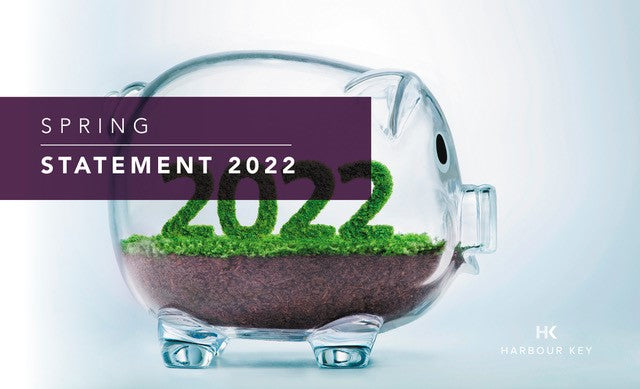
Chancellor Rishi Sunak has used his Spring Statement to outline how he will help the UK economy against rising inflation, soaring costs and significant global uncertainty. The Chancellor stressed the current "unusually high uncertainty" as a result of the war in Ukraine, being behind his thinking.
Normally, we do not expect tax announcements in the Spring Statement, it is more about an update on the economy, forecasts and Government spending. With the pressures on the economy and consumers, before the Ukraine conflict started, it was hoped that some give aways would be announced to ease the pressure. However, the 1.25% addition to the national insurance rate and dividend income tax rates, known as the health and social care levy announced in September last year, are not being scrapped or delayed.
Economy
The Office of Budget Responsibility (“OBR”) expects UK real GDP to grow by:
- 3.8% in 2022, (compared to 7.4% in 2021);
- 1.8% in 2023;
- 2.1% in 2024;
- 1.8% in 2025;
- 1.7 in 2026.
The Chancellor advised we could take comfort that the lower growth outlook had not affected jobs performance, with unemployment forecast to be lower in every year of the forecast. Unemployment is already back to the low levels before the pandemic (and is the reason many businesses are struggling to recruit).
The Chancellor set out the scene and current uncertainty but decided they were not reasons for deferring or scrapping the previously planned 1.25% tax increase, which he stated was “responsible taxation”. However, then came the giveaways, the first being the cut in fuel duty by 5p for 12 months (first cut in 20 years, but then it has been frozen since March 2011).
The Chancellor then set out his giveaways in the context of what he called his tax plan, which he believes will give a principled approach to cutting taxes, and includes continuing to be disciplined, with the first call on any extra resources being lower taxes, not higher spending. The tax plan in the Chancellor’s words “will build a stronger economy by reducing and reforming taxes over this Parliament”, which matches one of his main aims he set out in the Autumn Budget. The three parts to the tax plan:
- Help families with the cost of living;
- Create the conditions for higher growth. (What he kept referring to as People. Capital. Ideas);
- Share the proceeds of growth fairly, to ensure people are left with more of their own money.
The main tax points from the statement can be summarised and fit into the tax plan as follows:
Help families with the cost of living
- Fuel duty for petrol and diesel to be temporarily cut by 5 pence per litre across the whole of the UK, to take effect from 6pm on 23 March 2022, for 12 months;
- Businesses making green technology, including solar panels and heat pumps, will be exempt from business rates from 1 April 2022 (with the aim of making the production cheaper);
- The VAT rate on energy saving materials (ESM) such as thermal insulation or solar panels will be reduced from 5% to 0% from 1 April 2022, to incentivise homeowners to buy ESMs. (Except in Northern Ireland, as the VAT change must be agreed under the Northern Ireland protocol agreement as part of the Brexit deal);
- The self-employed will not pay Class 2 National Insurance contributions on profits between £11,908 (the Lower Profits Limit) and £6,725 (the Small Profits Threshold) from 6 April 2022, saving £158.60 for those self-employed with profits between these thresholds;
- The National Insurance threshold for employees and the self-employed will rise from the current figure £9,568 to £12,570 from 6 July 2022. It is estimated that a typical employee will receive a saving of over £330 a year (£165 per annum for the self-employed). For Directors, the threshold will be split as follows: £9,880 between 6 April and 5 July 2022 and £11,908 between 6 July 2022 and 5 April 2023;
- Please note there is no reference to an increase in the employer’s national insurance threshold but see below re the employment allowance.
Create the conditions for higher growth (People.Capital.ideas)
“to lift our growth and productivity we need the private sector to train more, invest more, and innovate more”
In this part the Chancellor reiterated several measures already announced in the Autumn Statement, with new measures/announcements to include:
People
- A review of the current tax system re training, including the operation of the Apprenticeship Levy and if there are better ways to incentivise businesses to invest in the right kinds of training.
- The Employment Allowance will be increased from £4,000 to £5,000, from 6 April 2022, to help small businesses with recruitment.
- From April 2023, the qualifying costs for R&D tax credits will be expanded to include cloud storage and associated data storage costs. Full details of the additional costs will be confirmed by Government in the summer, as well as a review of the tax relief in general.
- Government plans to make changes to capital allowances regime from April 2023, when the super-deduction ends. More details will be provided in the Autumn Statement following a consultation with industry.
The final rabbit…..
- Government plans to cut the basic rate of income tax by 1% from April 2024, reducing the rate from 20% to 19%. This will reduce the basic rate tax payable on non-savings income such as employment or pension income, as well as savings income such as bank interest.
With the 2022 tax year end rapidly approaching, take a look at our TAX PLANNING CHECKLIST to make sure you don’t miss out on any tax savings.
Should you wish to speak with us about a specific matter, or just to be a sounding board or for a chat, please do not hesitate to give us a call.
Please do not hesitate to give us a call us on 01452 713277



